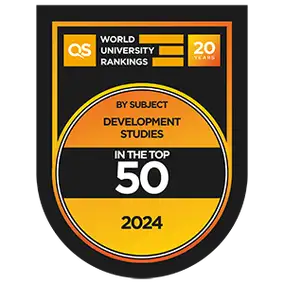Type of qualification
Level of study
Once you’ve graduated with a bachelor’s degree – or have equal experience – you can study at the postgraduate level. Doctoral qualifications require additional entry requirements.
Our courses follow the New Zealand Qualification Framework (NZQF) levels.
Time to complete
Where you can study
International students
International students are not New Zealand citizens or residents.
Study a Postgraduate Diploma in International Development – PGDipIntDev
You’ll extend your abilities to analyse international development issues and collect relevant data. You’ll also learn how to write persuasively about development issues.
Learn from experts in the field
In 1989, Massey University was the first university in New Zealand to offer postgraduate qualifications in development studies. We’ve built on that reputation by developing world-class courses in international development.
Our professors and lecturers are scholars and active researchers. They are also people with experience in development policy and practice in diverse contexts including the Pacific, Asia and Africa.
Further study
Your Postgraduate Diploma in International Development is also a pathway to advanced research at master’s level.
A PGDipIntDev is a good fit if you:
- want advanced knowledge and skills in international development
- value cultural awareness, sensitivity and empathy
- take ideas about ethics, engagement and citizenship seriously.
Entry requirements
Admission to Massey
All students must meet university entrance requirements to be admitted to the University.
Specific requirements
To enter the Postgraduate Diploma in International Development you will:
- have been awarded or qualified for a Bachelor of Arts with a major in development studies, or equivalent (eg Bachelor of Arts in International Relations, Social Anthropology or Sociology), with a minimum B- average across the 300-level courses, or
- a bachelor’s degree with a B- average across the 300-level courses along with relevant field or industry experience of an appropriate kind and duration.
You will need to provide copies of all official academic transcripts for studies taken at all universities other than Massey University.
Field experience includes:
- voluntary work (eg refugee resettlement with Red Cross – supporting a disadvantaged community group in New Zealand)
- other relevant work or experience (eg, a social worker, nurse or teacher in New Zealand or overseas)
- specific development experience (eg, an engineer who worked in Nepal).
- you will need to provide your curriculum vitae outlining your experience.
English language requirements
To study this qualification you must meet Massey University's English language standards.
Time limits for Honours, Distinction and Merit
Where your qualification is completed within the stated time limit and to a high standard, you may be able to graduate with Distinction or Merit.
- Look for information under ‘Student Progression’ in the General Regulations for Postgraduate Degrees, Postgraduate Diplomas and Postgraduate Certificates.
- Contact us through the Get advice button on this page if you have any questions.
Prior learning, credit and exemptions
For information on prior learning, exemptions and transfer of credit or other questions:
- review the Recognition of Prior Learning regulations
- contact us through the Get advice button on this page.
English language skills
If you need help with your English language skills before you start university, see our English for Academic Purposes (EAP) courses.
Maximum time limits for completion
There are maximum time limits to complete postgraduate qualifications. If you do not complete within the maximum time, you may be required to re-apply for the qualification if you wish to continue your studies.
Official regulations
To understand what you need to study and must complete to graduate read the official rules and regulations for this qualification.
You should read these together with all other relevant Statutes and Regulations of the University including the General Regulations for Postgraduate Degrees, Postgraduate Diplomas, and Postgraduate Certificates.
Returning students
For returning students, there may be changes to the majors and minors available and the courses you need to take. Go to the section called ‘Transitional Provisions’ in the Regulations to find out more.
In some cases the qualification or specialisation you enrolled in may be no longer be taking new enrolments, so may not appear on these web pages. To find information on the regulations for these qualifications go to the Massey University Calendar.
Please contact us through the Get advice button on this page if you have any questions.
Structure of the Postgraduate Diploma in International Development
If you study full-time, you’ll take 120 credits per year or 60 credits per semester.
If you are planning to progress to the Master of International Development you need to include 131707 Development Research Design in your Postgraduate Diploma in International Development.
Courses and specialisations
Key terms
- Courses
- Each qualification has its own specific set of courses. Some universities call these papers. You enrol in courses after you get accepted into Massey.
- Course code
- Each course is numbered using 6 digits. The fourth number shows the level of the course. For example, in course 219206, the fourth number is a 2, so it is a 200-level course (usually studied in the second year of full-time study).
- Credits
- Each course is worth a number of credits. You combine courses (credits) to meet the total number of credits needed for your qualification.
- Specialisations
- Some qualifications let you choose what subject you'd like to specialise in. Your major or endorsement is what you will take the majority of your courses in.
Credit summary
120 credits
- Core courses – 60 credits
- Electives from the Schedule – 60 credits
Course planning key
- Prerequisites
- Courses that need to be completed before moving onto a course at the next level. For example, a lot of 200-level courses have 100-level prerequisite courses.
- Corequisites
- Courses that must be completed at the same time as another course are known as corequisite courses.
- Restrictions
- Some courses are restricted against each other because their content is similar. This means you can only choose one of the offered courses to study and credit to your qualification.
Compulsory courses (Choose 60 credits from)
Course code: 131701 Rethinking Development 30 credits
An interdisciplinary course that explores and critically reflects on the trajectories of development thought and the contemporary processes of international development. The main areas covered include: the origins and meaning of development; paradigmatic approaches to development; and contemporary approaches to development practice.
View full course detailsCourse code: 131702 Development Management 30 credits
An applied course dealing with the processes and methods for the planning, implementation and evaluation of development programmes and projects. The course focuses on the managerial aspects and on the analytical tools that link contemporary policy frameworks and operational practices.
View full course detailsSubject courses (Choose 60 credits from)
Course code: 131703 Gender and Development 30 credits
An examination of the interaction of gender difference, development planning and social change. Selected topics include empowerment and human rights, masculinities, the household, work, education, and health.
View full course detailsCourse code: 131704 Sustainable Development 30 credits
A course concerned with the concept of sustainable development in all its dimensions (economic, social and environmental), focused on the 17 sustainable development goals (SDGs). Conceptual lenses, including Indigenous understandings of sustainability and the sustainable livelihoods framework, are also discussed.
View full course detailsCourse code: 131706 Globalisation and Development 30 credits
An examination of three critical themes in globalisation and development: conflict (and post-conflict), migration, and tourism.
View full course detailsCourse code: 131707 Development Research Design 30 credits
An examination of research methods and ethical issues and their application in development studies.
View full course detailsCourse code: 131708 Development Practicum 30 credits
Advanced study in development practice, involving 260 hours of professional work in an approved development agency. As an integral part of the course, students will reflect on how this work can be understood in relation to current literature on development theory and practice.
View full course detailsCourse code: 294717 Human Security in Application 30 credits
This course examines critical analysis and application of human security in national and international contexts. This would allow the participants to understand and engage in a wide range of theoretical studies and practical projects on human security.
View full course detailsFees and scholarships
Fees, student loans and free fees scheme
Your tuition fees may be different depending on the courses you choose. Your exact fees will show once you have chosen your courses.
There will also be some compulsory non-tuition fees and for some courses, there may also be charges for things such as study resources, software, trips and contact workshops.
- Get an estimate of the tuition fees for your qualification
- View a list of non-tuition fees that may be payable
Already know which courses you're going to choose?
You can view fees for the courses that make up your qualification on the course details pages.
Student loans (StudyLink) and Fees Free scheme
You may be eligible for a student loan to help towards paying your fees.
The New Zealand Government offers fees-free tertiary study for eligible domestic students. Find out more about the scheme and your eligibility on the Fees Free website. To use the site's eligibility checking tool, you will need your National Student Number.
Current and returning Massey students can find their National Student Number in the student portal.
- Student loans (StudyLink)
- Fees Free
- Student portal
Scholarship and award opportunities
Search our scholarships and awardsFees disclaimer
This information is for estimation purposes only. Actual fees payable will be finalised on confirmation of enrolment. Unless otherwise stated, all fees shown are quoted in New Zealand dollars and include Goods and Services Tax, if any. Before relying on any information on these pages you should also read the University's Disclaimer Notice.
Careers and job opportunities
You’ll get the skills and experience to begin your career in a wide range of government, non government organisations, multilateral and private sector spheres including organisations such as Red Cross, World Vision, the New Zealand Aid Programme, United Nations Development Programme and Caritas.
Graduate careers include positions such as:
- adviser in tourism, health, education or agriculture
- advocacy officer
- community affairs officer
- development officer
- diplomat
- human rights advisor
- policy analyst.
What our students say
“I have had overwhelmingly positive interactions with academic staff and classmates.”

Accreditations and rankings

QS Ranking - Development Studies
Massey is ranked 30th in the world for development studies in the Quacquarelli Symonds (QS) World University Rankings.
Related study options
Geography – Graduate Certificate in Arts
With Massey’s Graduate Certificate in Arts (Geography), you can study geography without completing a second bachelor’s degree. Learn how we interact with our cultural, social, and physical environments.
Geography – Bachelor of Arts (Honours)
With Massey’s Bachelor of Arts (Honours) (Geography) you can take your study of geography further.
Geography – Bachelor of Arts
Understand your place in the world with Massey's Bachelor of Arts (Geography). Learn how we interact with our cultural, social, and physical environments.
Geography – Diploma in Arts
With Massey's Diploma of Arts (Geography) you’ll learn how we interact with our cultural, social, and physical environments.
Geography – Postgraduate Diploma in Arts
Take your study of geography to a higher level with Massey’s Postgraduate Diploma in Arts (Geography). Enhance your research skills by investigating a topic in geography that interests you.
Geography – Master of Arts
Take your study of geography to a higher level with Massey’s Master of Arts (Geography). You can build on your undergraduate interest in geography and develop your critical research skills.
Geography – Graduate Diploma in Arts
The Graduate Diploma in Arts (Geography) will give you the equivalent of an undergraduate major in geography without having to complete a second bachelor’s degree.
Useful planning information

Key information for students
Compare qualifications and academic information across different New Zealand institutions. Learn more on careers.govt.nz